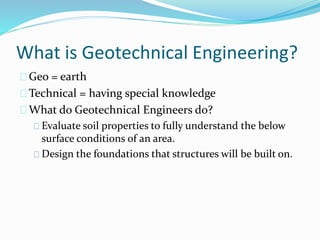A Biased View of Geotheta
A Biased View of Geotheta
Blog Article
The 9-Minute Rule for Geotheta
Table of ContentsGeotheta - The FactsGeotheta - The FactsGet This Report about GeothetaThe Buzz on GeothetaThe 45-Second Trick For Geotheta

They carry out site examinations, collect examples, do research laboratory examinations, and examine information to review the viability of the ground for construction jobs - Geo Tech Engineering. Based upon their findings, geotechnical designers give referrals for foundation design, slope stability, maintaining frameworks, and reduction of geotechnical threats. They team up with other professionals, such as architects, structural engineers, and building groups, to guarantee that geotechnical factors to consider are integrated into the overall project layout and execution
By assessing the actions and properties of dirt and rock, they can determine prospective geotechnical risks such as landslides, soil settlement, or slope instability. Their know-how aids protect against failures or mishaps that could endanger lives and residential property. Right here are some detailed duties and responsibilities of a geotechnical designer: Website Investigation: Geotechnical designers conduct website investigations to collect data on subsurface problems.
They interpret the data to understand the properties and behavior of the soil and rock, including their toughness, leaks in the structure, compaction characteristics, and groundwater conditions. Geotechnical Evaluation and Design: Geotechnical engineers examine the information gathered during site examinations to examine the stability and suitability of the site for building tasks. They carry out geotechnical estimations and modeling to evaluate elements such as bearing ability, settlement, incline security, lateral planet stress, and groundwater circulation.
The Greatest Guide To Geotheta
Foundation Layout: Geotechnical engineers play an important duty in making structures that can securely sustain the desired framework. They evaluate the soil problems and load demands to figure out the suitable structure type, such as shallow foundations (e.g., grounds), deep foundations (e.g (https://www.openstreetmap.org/user/geotheta)., piles), or specialized techniques like soil enhancement. They think about variables such as negotiation limits, bearing ability, and soil-structure communication to develop optimum foundation designs
They evaluate construction plans, monitor site tasks, and carry out field inspections to confirm that the layout referrals are adhered to. If unexpected geotechnical concerns arise, they examine the situation and offer suggestions for remediation or changes to the design. Risk Assessment and Mitigation: Geotechnical designers evaluate geotechnical risks and risks connected with the task website, such as landslides, liquefaction, or dirt erosion.

Partnership and Communication: Geotechnical designers function closely with various other professionals entailed in a project, such as engineers, architectural designers, and building teams. Reliable communication and cooperation are necessary to integrate geotechnical considerations into the overall project design and construction procedure. Geotechnical designers give technical expertise, response inquiries, and make certain that geotechnical demands are fulfilled.
Geotheta for Beginners
Here are some types of geotechnical designers: Foundation Engineer: Structure engineers specialize in making and assessing structures for frameworks. They assess the soil problems, lots demands, and website characteristics to determine one of the most suitable structure kind and layout, such as superficial structures, deep foundations, or specialized techniques like stack foundations.
They evaluate the variables affecting incline stability, such as soil properties, groundwater problems, and slope geometry, and establish methods to stop incline failures and mitigate threats. Quake Engineer: Quake designers focus on evaluating and designing frameworks to hold up against seismic pressures. They examine the seismic danger of a site, evaluate soil liquefaction potential, and create seismic style criteria to make certain the safety and security and durability of frameworks during earthquakes.
They do area testing, collect examples, and evaluate the accumulated data to identify the soil properties, geologic formations, and groundwater problems at a website. Geotechnical Instrumentation Designer: Geotechnical instrumentation engineers concentrate on monitoring and gauging the habits of dirt, rock, and structures. They mount and preserve instrumentation systems that keep track of variables such as soil negotiation, groundwater levels, incline movements, and architectural variations to examine performance and supply early cautions of potential problems.
The Main Principles Of Geotheta
They perform tests such as triaxial examinations, loan consolidation tests, direct shear tests, and leaks in the structure examinations to gather data for geotechnical analysis and style. Geosynthetics Designer: Geosynthetics designers specialize in the style and application of geosynthetic materials, such as geotextiles, geogrids, and geomembranes. They utilize these products to improve dirt stability, strengthen inclines, provide water drainage services, and control erosion.
They have a tendency to be investigatory people, which means they're intellectual, reflective, and investigative. They wonder, methodical, rational, analytical, and logical. A few of them are likewise social, indicating they're kind, generous, participating, client, caring, practical, understanding, skillful, and friendly. Does this sound like you? Take our totally free profession test to discover if geotechnical engineer is one of your top career matches.
In the workplace atmosphere, geotechnical designers use specialized software program devices to carry out calculations, produce styles, and evaluate data. They prepare reports, review task specs, communicate with customers and staff member, and coordinate task activities. The workplace setting provides a favorable environment for research study, analysis, and partnership with various other experts associated with the job.
All about Geotheta
They frequently check out project websites to perform site investigations, evaluate geotechnical problems, and gather data for analysis. These gos to include taking a trip to different places, occasionally in remote or tough terrains. Geotechnical engineers may carry out dirt tasting, conduct examinations, a knockout post and display building and construction activities to make certain that the geotechnical aspects of the job are being executed properly.
Geotechnical engineers likewise work in specialized geotechnical laboratories. Geotechnical research laboratory engineers function thoroughly in these settings, taking care of screening devices, operating tools, and videotaping data.
Report this page